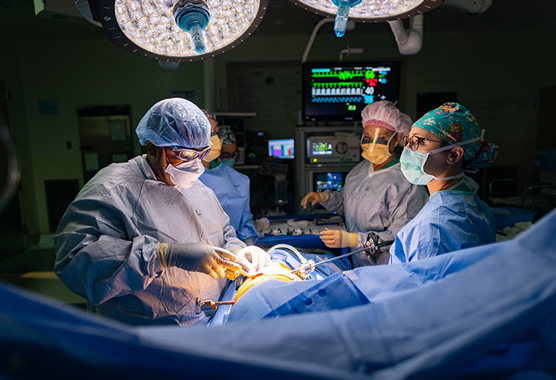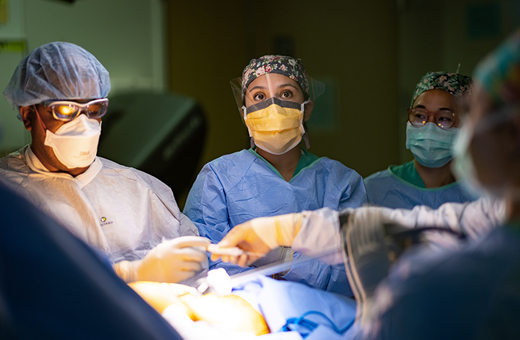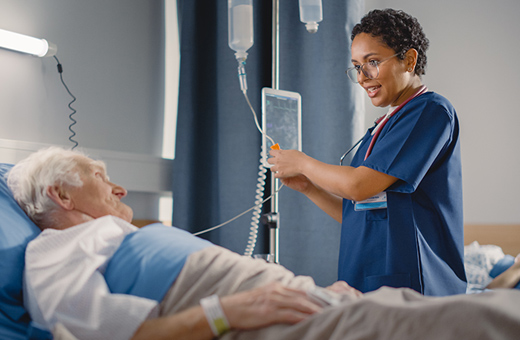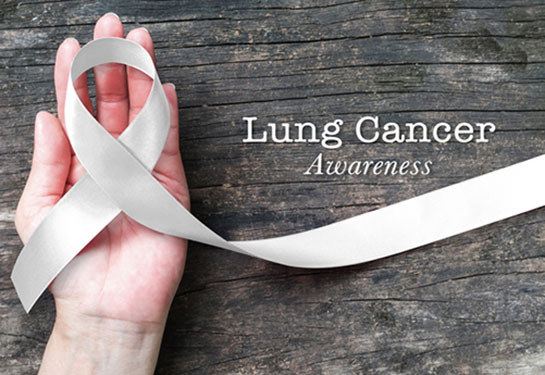Lung Cancer Surgery
Our advanced robotic procedures for lung cancer offer you precise surgery for a faster recovery. Our thoracic surgeons collaborate across specialties to deliver personalized care.
Medically reviewed by David Tom Cooke, M.D. on July 14, 2025.

Lung Cancer Surgery
At UC Davis Health, our expert thoracic surgeons specialize in advanced, minimally invasive lung cancer surgery using robotic-assisted technology. These approaches allow us to remove lung tumors through smaller incisions. This means more precise surgery and faster recovery time, especially for small, early stage cancers.
Our care team uses robotic navigational bronchoscopy, a minimally invasive procedure that helps us provide you with an accurate diagnosis. We also use this procedure to determine the cancer’s stage and make a surgical plan.
Our lung cancer program is fully integrated with UC Davis Comprehensive Cancer Center. Our close working relationship means you have the benefit of medical expertise across many different fields. It also gives you the opportunity to qualify for clinical trials, which can offer new lung cancer therapies not available elsewhere.
Lung Cancer Surgical Approaches
During lung cancer surgery, our expert thoracic surgeons remove some of your lung and the surrounding lymph nodes to treat and cure lung cancer.
Our surgical team uses advanced techniques to remove cancerous lung tissue while preserving as much of your healthy lung as possible. Approaches include:
Robotic-assisted Lobectomy
Surgeons remove a section (lobe) of your lung through small incisions using robotic instruments. This method provides excellent outcomes and faster recovery compared to open surgery.
Robotic-assisted Segmentectomy and Wedge Resection
For small or early stage tumors, surgeons may remove only a segment or wedge of the lobe. Robotic navigational bronchoscopy allows us to target nodules precisely.
Sleeve Resection
For some patients, we remove and put back together a segment of the airway, preserving lung function. This procedure is often used for centrally located tumors and prevents the need to remove the entire lung on one side.
Team-Based Cancer Care
Lung cancer cases are often reviewed by a team of specialists from UC Davis Comprehensive Cancer Center. Our team includes experts in thoracic surgery, interventional pulmonology, medical oncology, radiation oncology, radiology and pathology.
We provide personalized cancer care specific to by the genetic profile of the tumor you have. You may be eligible for advanced targeted therapies and immunotherapies that boost your immune system to destroy cancer.
Access to Clinical Trials
As part of a National Cancer Institute-designated comprehensive cancer center, UC Davis Health offers patients access to clinical trials. If you qualify for a clinical trial, you may participate in studies researching new therapies aimed at improving lung cancer outcomes.
Request an Appointment
As Sacramento's No. 1 hospital, you'll benefit from unique advantages in primary care and specialty care. This includes prevention, diagnosis and treatment options from experts in 150 specialties.
Referring Physicians
To refer a patient, submit an electronic referral form or call.
800-4-UCDAVIS
Patients
Call to make an appointment.
Consumer Resource Center
800-2-UCDAVIS
Robotic lung cancer surgery is a major procedure. Your care team will explain how to prepare and what to expect before, during and after surgery. You may need imaging, lung function tests and consultations. You may also receive chemotherapy, targeted therapy or immunotherapy before surgery, depending on your specific cancer type and stage.
-

Before Lung Cancer Surgery
See the health benefits of quitting tobaccoarrow_forwardYour provider will explain what medications you should take and what you should and should not eat and drink leading up to the surgery. You should arrange for someone to take you to your surgery appointment and to take you home afterward. You also will need help with daily activities after you return home.
If you smoke, you should make every effort to quit. Talk to your provider at least two weeks before surgery for recommendations on how to quit. Our team will also work with you on quitting. Your blood flow improves when you avoid smoking, and this gives you a chance for a quicker recovery after surgery.
-

During Lung Cancer Surgery
Learn more about anesthesiologyarrow_forwardYour thoracic surgeon may use a robotic system to remove cancerous tissue with extreme precision. Our thoracic anesthesiologists provide specialized care to ensure you have a safe and pain-free experience throughout the operation.
-

After Lung Cancer Surgery
Learn more about physical medicine and rehabarrow_forwardMost patients recover in the hospital for a few days. Some go home the next day. We may place chest tubes to drain fluid or air. Respiratory, physical, and occupational therapy starts soon after surgery to help you regain your lung function. After going home, you begin follow-up care with our lung cancer team.
Home Care After Lung Cancer Surgery
Your at-home recovery depends on your overall health, the condition being treated and surgery type. Be sure to follow your care team’s instructions to ease recovery and minimize complications.
Take Medications
Take medications for pain and other symptoms as prescribed by your provider.
Participate in Therapies
Continue breathing exercises and walking to promote lung recovery.
Increase Activity Gradually
Most patients can return to daily activities quickly, with guidance from their care team.
When to Contact Your Surgeon
Call your thoracic surgeon if you develop a fever or notice signs of infection at the surgical site, such as redness or discharge.

Ranked among the nation’s best hospitals
A U.S. News & World Report best hospital in cardiology, heart & vascular surgery, diabetes & endocrinology, ENT, geriatrics, neurology & neurosurgery, and pulmonology & lung surgery.

Ranked among the nation’s best children’s hospitals
U.S. News & World Report ranked UC Davis Children’s Hospital among the best in pediatric nephrology, orthopedics*, and pulmonology & lung surgery. (*Together with Shriners Children’s Northern California)

Ranked Sacramento’s #1 hospital
Ranked Sacramento’s #1 hospital by U.S. News, and high-performing in aortic valve surgery, back surgery (spinal fusion), COPD, colon cancer surgery, diabetes, gynecological cancer surgery, heart arrhythmia, heart failure, kidney failure, leukemia, lymphoma & myeloma, lung cancer surgery, pacemaker implantation, pneumonia, prostate cancer surgery, stroke, TAVR, cancer, orthopedics, gastroenterology & GI surgery, and urology.

The nation’s highest nursing honor
UC Davis Medical Center has received Magnet® recognition, the nation’s highest honor for nursing excellence.

World-class cancer care
One of ~59 U.S. cancer centers designated “comprehensive” by the National Cancer Institute.

A leader in health care equality
For the 13th consecutive year, UC Davis Medical Center has been recognized as an LGBTQ+ Healthcare Equality Leader by the educational arm of America’s largest civil rights organization.

